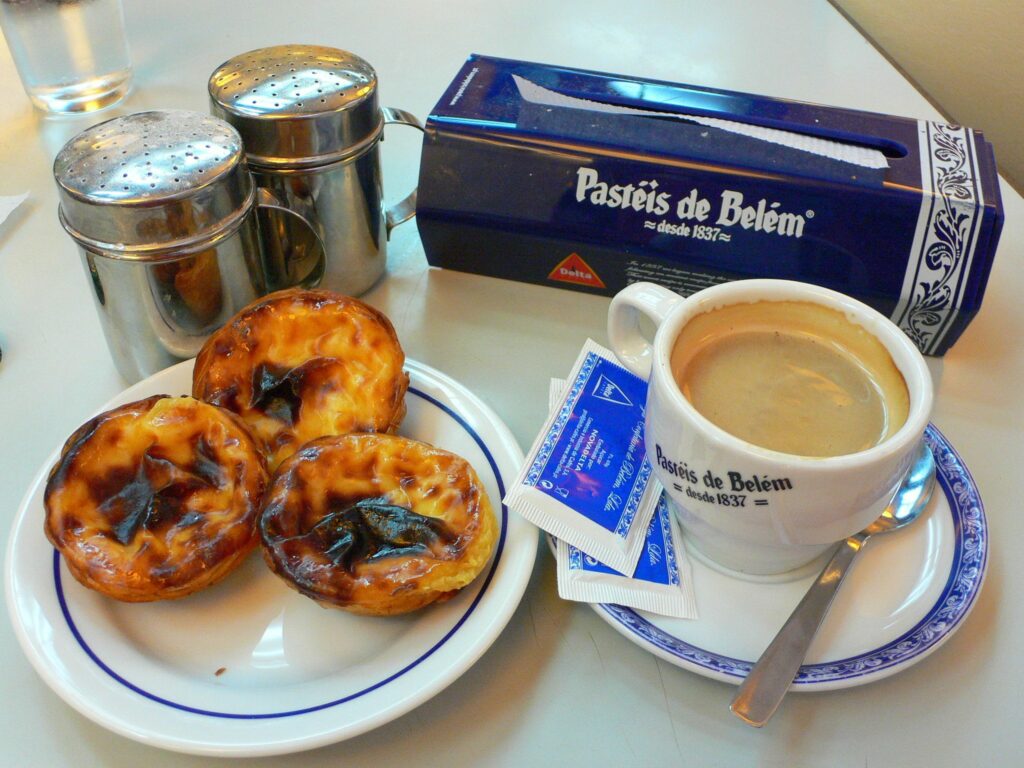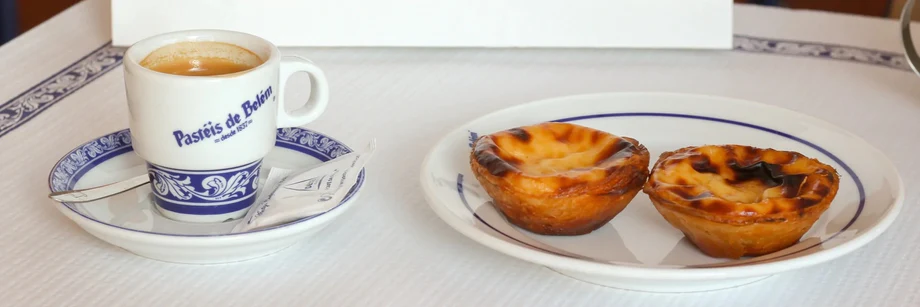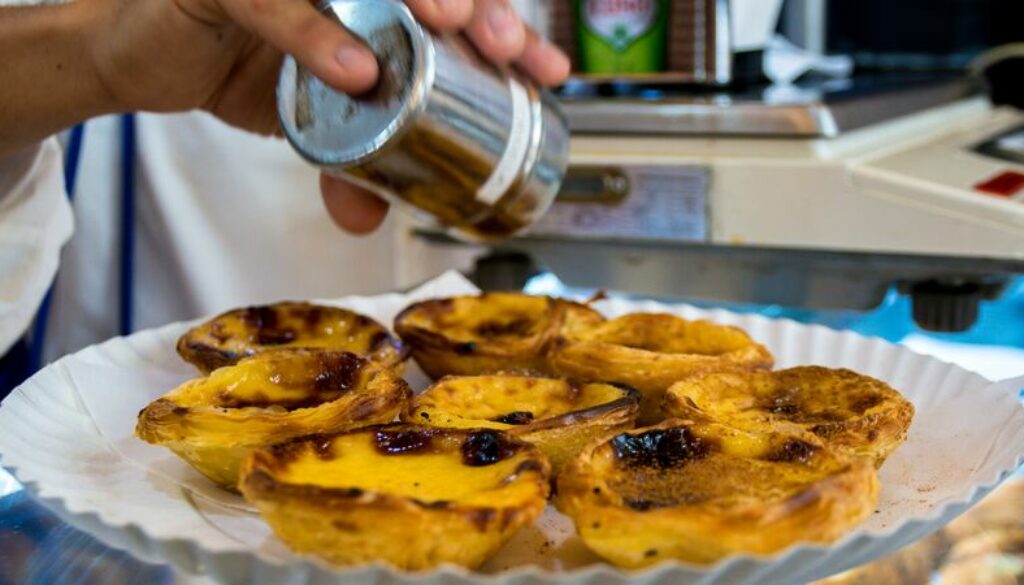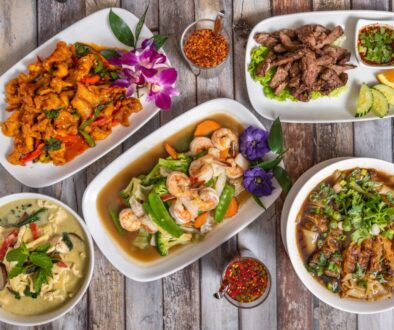Lisbon’s Culinary Charms: From Pastéis de Nata to Seafood Feasts
Lisbon’s culinary charms are a captivating blend of traditional Portuguese flavors and innovative culinary techniques, making it a must-visit destination for food lovers. Lisbon, the capital city of Portugal, has become a hotbed for culinary enthusiasts seeking unique and flavorsome experiences. From the iconic Pastéis de Nata, a heavenly Portuguese pastry, to the abundant and delectable seafood feasts, this city offers a wide range of culinary delights that will satisfy even the most discerning palates.
When it comes to food, Lisbon embraces its rich culinary heritage while also embracing new trends and global influences. The culinary scene of Lisbon is characterized by its diversity, creativity, and the perfect blend of traditional and contemporary flavors. Whether you’re a food connoisseur, an adventurer, or simply someone who enjoys good food, Lisbon has something remarkable to offer.
The Iconic Pastéis de Nata: A heavenly Portuguese pastry
The iconic Pastéis de Nata is a heavenly Portuguese pastry that has achieved worldwide fame for its irresistible taste and delicate texture. These custard tarts are a true symbol of Portuguese gastronomy and are an essential part of any culinary journey through Lisbon.
Originating from the famous Pasteis de Belém bakery in the Belém district of Lisbon, Pastéis de Nata has a rich history dating back to the 18th century. The recipe is said to be a closely guarded secret, passed down through generations and known only to a select few.
The Pastéis de Nata is a harmonious combination of flavors and textures. The pastry is light, flaky, and buttery, providing the perfect vessel for the creamy custard filling. The custard itself is made from a blend of egg yolks, cream, sugar, and a touch of vanilla, resulting in a silky smooth texture and a rich, sweet taste.
The true magic of the Pastéis de Nata lies in its caramelized top, which adds a delightful contrast of textures and a hint of smokiness to each bite. The tarts are baked at high temperatures, causing the sugar on the surface to caramelize and create a crisp, burnt sugar layer that enhances the overall flavor profile.
While Pastéis de Nata can be found in various bakeries and cafés throughout Lisbon, it is said that the original Pastéis de Belém bakery still holds the key to the most authentic and mouthwatering version of this delectable treat. Located near the famous Jerónimos Monastery, the bakery has been producing Pastéis de Nata since 1837, following the original secret recipe. The bakery’s interior is adorned with beautiful azulejo tiles, creating a charming ambiance that adds to the overall experience of enjoying this iconic pastry.
The popularity of Pastéis de Nata has transcended borders, and you can now find variations of this pastry in different parts of the world. However, there is nothing quite like savoring a freshly baked Pastéis de Nata in Lisbon, where the flavors are at their best and the authenticity is unparalleled.

Discovering the Seafood Feasts of Lisbon
Lisbon, with its proximity to the Atlantic Ocean, offers a seafood lover’s paradise. The city is renowned for its abundant and delectable seafood feasts, showcasing the freshest catches from the sea. From traditional dishes to innovative culinary creations, Lisbon’s seafood scene is sure to delight even the most discerning palates.
One of the most iconic seafood dishes in Lisbon is grilled sardines. These small, oily fish are grilled to perfection and served with a squeeze of lemon and a sprinkle of salt. The smoky flavor and tender flesh of the sardines make for a truly satisfying dining experience. In June, during the popular Santo António festivities, the streets of Lisbon come alive with the aroma of grilled sardines, as locals and visitors gather to celebrate and indulge in this beloved dish.
Another must-try seafood feast in Lisbon is the famed Portuguese fish stew, known as caldeirada. This hearty, flavorful dish is made with a variety of fish, such as cod, sea bass, and monkfish, along with potatoes, tomatoes, onions, and a medley of fragrant herbs and spices. The combination of the tender fish and the rich, aromatic broth creates a taste sensation that is both comforting and satisfying.
For those with a taste for shellfish, Lisbon’s seafood restaurants offer an array of options. From succulent prawns to juicy clams, these delicacies are often cooked simply, allowing the natural flavors of the seafood to shine through. One popular dish is açorda de marisco, a hearty bread and seafood soup that features a flavorful broth infused with garlic, coriander, and olive oil. This dish is a true tribute to Lisbon’s maritime heritage and the bounty of the sea.
Exploring Lisbon’s Traditional Dishes and Flavors
While Lisbon is renowned for its seafood, the city also boasts a rich array of traditional dishes that highlight the authentic flavors of Portuguese cuisine. From hearty stews to indulgent desserts, Lisbon’s traditional dishes will take you on a culinary journey through the city’s history and culture.
One quintessential Portuguese dish that can be found in Lisbon is bacalhau à brás, a flavorful codfish dish. Salted cod is combined with scrambled eggs, potatoes, onions, and olives, creating a harmonious blend of textures and flavors. The dish is often garnished with parsley and served with a side of crisp greens, making it a satisfying and well-balanced meal.
Another traditional dish to try in Lisbon is caldo verde, a comforting kale and potato soup. The soup is made by simmering potatoes, onion, and garlic, then adding thinly sliced kale to the broth. The result is a nourishing, flavorsome soup that is often enjoyed with a slice of traditional Portuguese cornbread. Caldo Verde is a popular dish across Portugal, but each region adds its own special touch to make it unique.
Lisbon is also renowned for its love of offal, and adventurous eaters can sample dishes like dobrada à moda do Porto, which is tripe stewed with white beans, carrots, and sausage. This hearty and flavorful dish showcases the Portuguese appreciation for utilizing every part of the animal and ensuring nothing goes to waste.
No exploration of Lisbon’s traditional dishes would be complete without mentioning the famous pasteis de bacalhau. These crispy codfish cakes are made from salted codfish mixed with mashed potatoes, onions, and a combination of herbs and spices. The mixture is then shaped into round patties and fried until golden brown. These bite-sized treats are incredibly popular as a snack or appetizer and can be found in bakeries, cafés, and traditional food markets throughout the city.
The Fusion of Global Influences in Lisbon’s Cuisine
Lisbon’s culinary scene is a testament to the city’s vibrant multiculturalism and its penchant for embracing global influences. Alongside the traditional Portuguese dishes, Lisbon offers a diverse range of international cuisines that have been seamlessly integrated into the local culinary landscape.
One prime example of this fusion can be found in the vibrant neighborhood of Mouraria, where Portuguese and African flavors harmoniously blend. African immigrants have brought their rich culinary traditions to Lisbon, resulting in a tantalizing array of dishes that showcase the diverse flavors of the continent. From mouthwatering Mozambican peri-peri chicken to flavorful Cape Verdean cachupa, these Afro-Portuguese dishes offer a unique gastronomic experience.
Lisbon also boasts a thriving Asian food scene, with restaurants serving up authentic flavors from countries such as Japan, Thailand, and China. From sushi bars to ramen houses, visitors can indulge in an exquisite range of Asian cuisine that has been expertly prepared by skilled chefs. The inclusion of Asian influences in Lisbon’s culinary tapestry adds a new dimension to the city’s dining options and highlights its cosmopolitan character.
Lisbon’s culinary fusion extends to the Middle Eastern flavors as well. The city is home to a number of Lebanese and Moroccan restaurants that serve aromatic dishes such as falafel, hummus, tagines, and kebabs. These Middle Eastern flavors add depth and diversity to Lisbon’s culinary scene, allowing visitors to explore a different realm of taste within the city.
The fusion of global influences in Lisbon’s cuisine is a testament to the city’s openness and its ability to embrace and adapt to new flavors and culinary traditions. Whether you’re in search of traditional Portuguese cuisine or craving the exotic flavors of the world, Lisbon offers an extraordinary dining experience that caters to every palate.

A Journey Through Lisbon’s Marketplaces and Food Markets
To truly immerse yourself in Lisbon’s culinary charms, a journey through the city’s marketplaces and food markets is a must. These bustling hubs of activity not only provide opportunities to purchase fresh local produce but also offer a chance to sample a wide range of traditional and international foods.
The Mercado da Ribeira, also known as Time Out Market, is a popular destination for food lovers. Located near the Cais do Sodré neighborhood, this market brings together some of the city’s top chefs, food artisans, and vendors under one roof. From fresh seafood to gourmet burgers, artisanal cheeses to decadent pastries, the Time Out Market is a culinary paradise that showcases the best of Lisbon’s food scene.
For a more traditional market experience, the Mercado de Campo de Ourique is the place to go. This charming market is located in the Campo de Ourique neighborhood and offers a wide array of local products, from fresh fruits and vegetables to cured meats and cheeses. You can wander through the market stalls, taste sample bites, and chat with friendly vendors who are more than happy to share their knowledge and passion for their products.
Another notable market in Lisbon is the Mercado 31 de Janeiro. Located in the bustling Avenida Almirante Reis, this market is a treasure trove for food enthusiasts looking to explore authentic Portuguese flavors. Here, you can find everything from fresh fish and seafood to regional specialties, such as sausages, cheeses, and olives. Immersing yourself in the vibrant atmosphere of the market and interacting
Vegan and Vegetarian Options in Lisbon
Lisbon has become a foodie haven not only for meat lovers but also for those following a vegan or vegetarian lifestyle. The city has seen a surge in vegan and vegetarian-friendly options, with numerous restaurants and cafes catering to plant-based diets.
Restaurants such as The Food Temple, Terra, and Ao 26 – Vegan Food Project have gained popularity for their creative and delicious vegan and vegetarian dishes. These establishments use locally sourced, seasonal ingredients to create innovative and flavorful plant-based meals that cater to a wide range of tastes and preferences.
In addition to dedicated vegan and vegetarian restaurants, many traditional Portuguese eateries also offer plant-based options. You can find vegan versions of traditional dishes like pastéis de nata, bacalhau, and even feijoada, typically made with tofu or seitan as a substitute for meat.
Lisbon’s food markets, including Mercado da Ribeira and Mercado de Campo de Ourique, also provide an array of vegan and vegetarian options. With fresh produce, artisanal bread, plant-based spreads, and plant-based cheese alternatives, these markets offer a culinary paradise for vegans and vegetarians alike.
Overall, Lisbon has embraced the growing demand for vegan and vegetarian options, making it a welcoming destination for those seeking plant-based dining experiences.
The Rise of Gastronomic Tourism in Lisbon
Lisbon has experienced a significant rise in gastronomic tourism in recent years. The city’s vibrant food scene, coupled with its rich culinary history and diverse flavors, has attracted food lovers from around the world.
Gastronomic tourists are drawn to Lisbon for its traditional dishes, such as bacalhau, pasteis de nata, and caldo verde. They seek out traditional and modern restaurants, food markets, and even cooking classes to immerse themselves in the local food culture.
In addition to the traditional cuisine, Lisbon’s fusion of global influences has also played a significant role in attracting gastronomic tourists. The city’s diverse culinary scene, with influences from Africa, Asia, and the Middle East, offers a unique blend of flavors and experiences that appeal to adventurous eaters.
Lisbon’s rising gastronomic reputation has also been bolstered by recognition from prestigious food guides and awards. Several Lisbon restaurants have earned Michelin stars, placing the city firmly on the map for culinary excellence.
The rise of gastronomic tourism in Lisbon has not only put the city’s food scene in the spotlight but also contributed to its overall tourism growth. Travelers are now flocking to Lisbon not just for its historical sites and beautiful architecture, but also for its remarkable culinary experiences and the opportunity to explore the city’s diverse flavors.
The Importance of Wine in Lisbon’s Culinary Culture
Wine holds a special place in Lisbon’s culinary culture, with a rich history of winemaking and a dedication to producing exceptional wines. The city’s proximity to several wine regions, such as the Douro and Alentejo, contributes to its strong wine tradition.
One of the most famous wines associated with Lisbon is the fortified wine known as Port. Produced in the Douro Valley, Port wine is often enjoyed as an aperitif or dessert wine. Its intense flavors and richness perfectly complement a variety of traditional Portuguese dishes, making it a popular choice among locals and visitors alike.
Lisbon also has its own wine region, called the Lisbon Wine Region, which produces a range of high-quality wines. The region is known for its diverse terroir and grape varieties, resulting in a wide selection of red, white, and rosé wines. From aromatic and crisp whites to robust and full-bodied reds, the wines of Lisbon pair beautifully with the local cuisine, enhancing the overall dining experience.
Wine bars and cellars are scattered throughout the city, offering a wealth of options for wine enthusiasts to sample and learn about Portuguese wines. These establishments often provide tastings, allowing visitors to explore different styles and regions while expanding their knowledge of Portuguese winemaking.
When dining in Lisbon, wine is considered an integral part of the meal. Locals take pride in pairing the perfect wine with their food, enhancing the flavors, and creating a well-rounded dining experience. Whether it’s a fine dining restaurant or a traditional tasca, wine is always appreciated and enjoyed alongside the culinary delights of Lisbon.
Lisbon’s Street Food Delights
Lisbon’s vibrant street food scene offers locals and visitors a taste of the city’s culinary delights on the go. From iconic snacks to innovative creations, the street food in Lisbon showcases the diverse flavors and culinary traditions of the city.
One of the most famous street foods in Lisbon is the bifana, a classic Portuguese sandwich made with thin slices of marinated pork, and served in a soft roll. The tender and flavorful meat combined with the simple yet delicious combination of bread and sauce makes the bifana a satisfying and popular choice among locals and tourists.
Another street food favorite is the prego, a juicy beef or pork steak seasoned with garlic and served in a bread roll. The prego is often accompanied by a spicy sauce or mustard, giving it an extra kick of flavor. This tasty sandwich is particularly popular during lunchtime and can be found at various food stalls and street markets throughout the city.
Seafood lovers can indulge in another Lisbon street food specialty, the delicious and aromatic percebes. These goose barnacles are a true delicacy and are known for their unique flavor that combines the sweetness of the sea with a slight iodine taste. Sold by street vendors, percebes are typically enjoyed fresh and unadulterated, allowing their natural flavors to be the star of the show.
For those with a sweet tooth, Lisbon’s street food scene offers a range of delectable treats. The pastel de nata, a creamy custard tart with a crispy, flaky crust, is a must-try. These iconic pastries can be found in bakeries and street stalls throughout the city, and are often dusted with cinnamon or powdered sugar for an extra touch of indulgence.
Lisbon’s street food scene is a lively and flavorful way to experience the city’s culinary delights. Whether you’re grabbing a quick snack on the go or wandering through bustling food markets, the street food of Lisbon is sure to satisfy your cravings and introduce you to the authentic flavors of the city.
Chasing the Famous Food Trucks in Lisbon
Food trucks have become a popular phenomenon in Lisbon, adding a modern and innovative twist to the city’s culinary scene. These mobile kitchens offer a diverse range of mouthwatering dishes, taking the street food experience to a whole new level.
One of the most famous food trucks in Lisbon is the “Burger Lab,” known for its gourmet and indulgent burgers. The “Burger Lab” combines quality ingredients, creative flavor combinations, and skilled craftsmanship to create burgers that are both visually stunning and incredibly tasty. From classic beef burgers to vegetarian and vegan options, the “Burger Lab” has something to please every palate.
“Aborígene” is another renowned food truck in Lisbon, specializing in traditional Portuguese dishes with a contemporary twist. With a focus on local and organic ingredients, “Aborígene” offers a range of innovative dishes inspired by Portuguese cuisine. From octopus tacos to pork belly sandwiches, these culinary delights are a fusion of tradition and creativity.
Lisbon’s food truck scene is constantly evolving, with new trucks and culinary concepts emerging all the time. From gourmet hot dogs and sushi burritos to Thai street food and artisanal ice cream, there is a food truck to suit every taste and craving.
Following the food trucks in Lisbon can be an exciting adventure as they often park in different locations throughout the city. The best way to track them down is through social media or food truck festivals that bring together various trucks in one place, allowing visitors to sample an array of flavors and cuisines.
The Rebirth of Traditional Recipes and Techniques
In recent years, Lisbon has witnessed a revival of traditional recipes and cooking techniques that were once on the brink of being lost. Chefs and food enthusiasts have taken it upon themselves to rediscover and preserve these age-old culinary traditions, breathing new life into the city’s gastronomic heritage.
One such revival is the use of ancient grains and forgotten ingredients in Portuguese cuisine. Chefs are turning to traditional grains like spelt, rye, and barley, as well as underutilized fruits and vegetables, to create innovative and unique dishes. This revival of traditional ingredients not only adds depth and complexity to the cuisine but also helps in the preservation of local biodiversity.
Alongside the use of traditional ingredients, chefs in Lisbon are reviving forgotten cooking techniques to create exceptional dishes. Slow cooking, fermentation, and preservation methods are being reintroduced into the culinary repertoire, adding layers of flavor and complexity to traditional recipes. For instance, the art of smoking and curing meats and fish is being revived, resulting in delicious charcuterie and smoked specialties that pay homage to Lisbon’s maritime heritage.
In addition to traditional recipes, Lisbon is also witnessing the rebirth of traditional artisanal products. For example, local producers are reviving the craft of making traditional cheeses, sausages, and bread, using traditional methods and locally sourced ingredients. This focus on quality and craftsmanship is not only preserving traditional flavors but also providing an opportunity for small-scale producers to thrive.
The rebirth of traditional recipes and techniques in Lisbon is a testament to the city’s dedication to preserving its culinary heritage and celebrating its rich gastronomic history. By embracing these traditions, Lisbon is able to showcase its unique flavors and create memorable dining experiences that connect the past with the present.
Conclusion
Lisbon’s culinary scene is a harmonious blend of tradition, innovation, and global influences. From the iconic Pastéis de Nata to the sumptuous seafood feasts, this city offers a culinary adventure that will delight your taste buds and leave you craving for more. With its evolving food culture, diverse culinary offerings, and hidden gastronomic gems, Lisbon has become a top destination for food enthusiasts seeking extraordinary culinary experiences.
Also Read:
Shanghai Showcase: Navigating China’s Cultural Hub
10 Must-Visit National Parks for Thrill-Seekers in the USA



